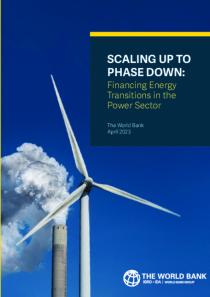The energy transition in low- and middle-income countries (LICs and MICs) will entail an unprecedented expansion and transformation of power sector infrastructure. This transformation will require a massive scaling up of renewable energy and energy efficiency to meet rapidly growing demand, followed by a phasing down of coal-fired power generation. To finance a just transition that is consistent with both the goals of ensuring universal access to affordable, reliable, sustainable, and modern energy by 2030, and the 2015 Paris Agreement on Climate Change, developing countries will have to mobilize far more capital than they do today. LICs and MICs need support—including low-cost (“concessional”) financing—to overcome barriers at each stage of the virtuous cycle; initially to scale up clean energy development and to boost efficiency, and then to phase down the use of coal for power generation. Because the majority of the financing needs of power sector transition must come from private sources, and because public and donor finance are so scarce, resources with a higher grant element—or concessionality—must be prioritized strategically across the virtuous cycle and deployed with a disciplined approach. To create conditions for mobilizing the largest possible amounts of private capital, the use of concessional finance must be scaled up, sustained, coordinated, and carefully programmed.

